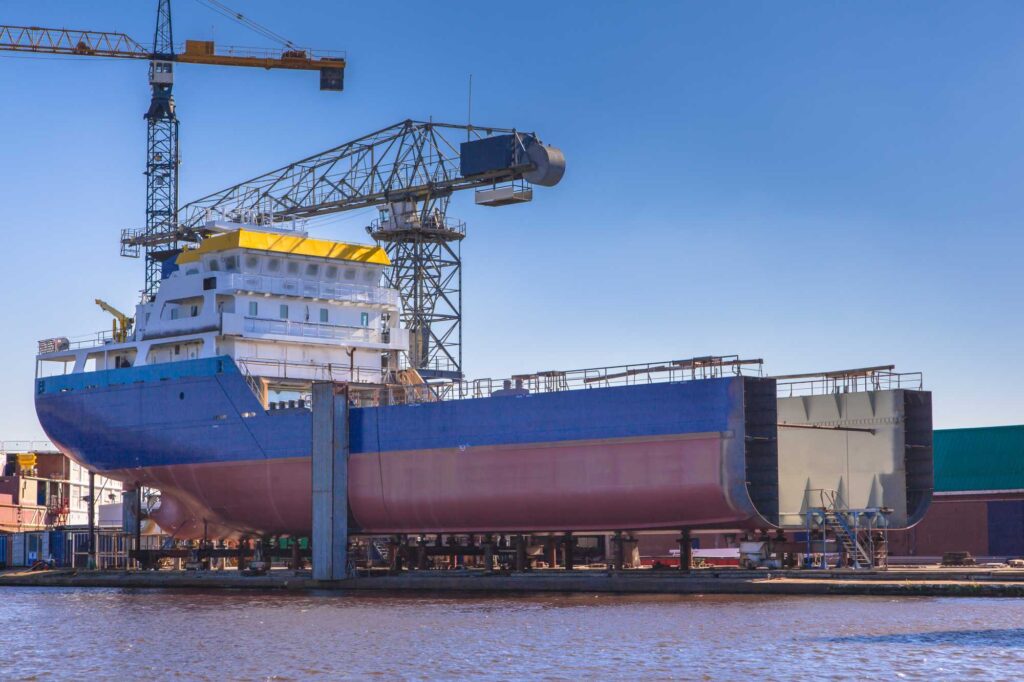Learn how industrial desiccant dehumidifiers protect ships, cargo, and equipment in shipbuilding and marine logistics. Reduce corrosion, prevent mold, and ensure cargo quality during sea transport.
Humidity Control in Shipbuilding, Ship Repair & Marine Cargo Transport

Managing humidity is critical in shipbuilding, ship repair, and the marine cargo industry. Uncontrolled moisture leads to corrosion, mold, damaged cargo, and expensive downtime. Vision Air Conditioning provides industrial desiccant dehumidification solutions for every stage from vessel construction and maintenance to safe cargo transportation.
- How to minimize idle time of tankers in port while drying cargo holds?
- How to cut maintenance and repair costs for ships?
- How to preserve ships, oil derricks, and tankers from corrosion?
- How to ensure product safety and quality during sea voyages?
- How to protect electrical equipment and sensitive electronics on board?
To address these challenges, maintaining strict humidity control is essential. Our desiccant dehumidifiers offer proven results for shipyards, marine logistics, and vessel preservation. Explore more about our industrial dehumidifiers for specialized marine environments.
Problems Caused by Excess Humidity at Sea
- Damage to food cargo, packaging, and materials during transit
- Condensation on hold surfaces, prompting metal corrosion
- Mildew and bacteria growth on goods and ship structures
- Failures in electrical equipment and navigational systems
- Reduced quality of hygroscopic products: grains, tobacco, coffee, paper, etc.
- Increased costs in repairs, preservation, and maintenance
When ships are at sea, temperature drops can cause air in cargo holds to reach dew point, resulting in condensation and increased relative humidity. This makes it crucial to maintain proper air flow and moisture levels with advanced dehumidification.
Dehumidifier Applications on Marine Vessels
- Cargo holds and storage rooms
- Engine rooms and machinery spaces
- Cabins and living quarters
- Upper deck cabins and bridges
- Pump rooms
- Long-term ship, tanker, and oil derrick preservation
Learn more about dry room dehumidifiers and MDC range dehumidifiers for specialized marine and offshore humidity control.
Benefits of Desiccant Dehumidifiers for Shipbuilding & Marine Use
- High drying efficiency with low energy consumption
- Operates efficiently at low temperatures
- Compact, easy-to-install design for confined shipboard spaces
- Stainless steel and aluminum-zinc corrosion-resistant bodies
- Fully automatable humidity control
- Reduces drying time of cargo holds, minimizing idle port time
- Prevents corrosion and preserves cargo integrity
- Complies with international (EU) safety and quality standards
How Desiccant Dehumidifiers Work
The process air passes through a rotating silica-gel rotor, adsorbing water vapor. A second air stream, preheated to 90-140°C, regenerates the rotor, removing moisture as warm, moist exhaust. This cycle keeps humidity below critical thresholds and protects ship assets year-round.

Recommended Humidity & Temperature for Ship Cargo
| Product/Material | Relative Humidity (%) | Temperature (°C) |
|---|---|---|
| Vegetables | 85-90 | 4-10 |
| Fruit | 85-90 | 8-14 |
| Chilled meat | 80-85 | -2-0 |
| Frozen meat | 90-95 | -18-20 |
| Dairy butter | 90 | -5-10 |
